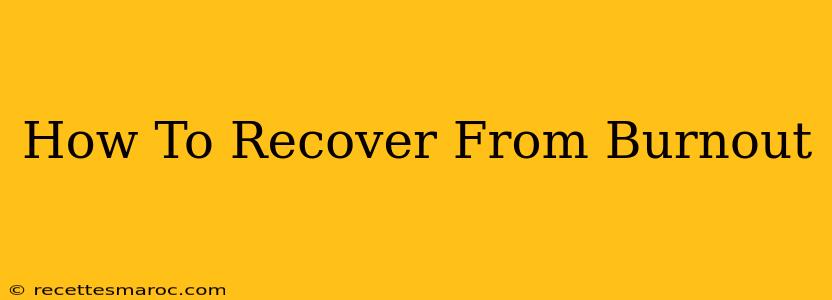Burnout. It's a word that's become increasingly common in our fast-paced world, a feeling of emotional, physical, and mental exhaustion caused by prolonged or excessive stress. If you're feeling overwhelmed, depleted, and cynical, you might be experiencing burnout. But the good news is: you can recover. This guide will provide actionable steps to help you navigate this challenging experience and reclaim your well-being.
Understanding Burnout: Recognizing the Signs
Before we dive into recovery, it's crucial to understand the signs. Burnout isn't just feeling tired; it's a deeper, more pervasive exhaustion. Common symptoms include:
- Emotional Exhaustion: Feeling drained, emotionally empty, and lacking empathy.
- Depersonalization: Developing a cynical or detached attitude towards your work and others.
- Reduced Personal Accomplishment: Feeling ineffective, lacking a sense of accomplishment, and questioning your abilities.
- Physical Symptoms: Headaches, sleep disturbances, digestive problems, and a weakened immune system.
Identifying these signs is the first step towards recovery. Don't dismiss these feelings as "just stress." Acknowledging the problem is critical to finding a solution.
Strategies for Burnout Recovery: A Holistic Approach
Recovering from burnout isn't a quick fix; it requires a holistic approach that addresses your physical, emotional, and mental needs. Here are key strategies:
1. Prioritize Rest and Relaxation:
This is arguably the most important step. Your body and mind need time to heal. This means:
- Sufficient Sleep: Aim for 7-9 hours of quality sleep per night. Establish a consistent sleep schedule.
- Mindfulness and Meditation: Practice mindfulness techniques or meditation to reduce stress and improve mental clarity. Even short, 5-minute sessions can make a difference.
- Regular Breaks: Schedule regular breaks throughout your day to avoid prolonged periods of intense work. Step away from your desk, go for a walk, or simply close your eyes and breathe deeply.
2. Re-evaluate Your Workload and Boundaries:
Burnout often stems from an unsustainable workload or a lack of boundaries. Consider:
- Delegation: Can you delegate tasks to others?
- Saying "No": Learn to politely decline additional responsibilities if you're already overwhelmed.
- Time Management Techniques: Implement time management strategies like the Pomodoro Technique to improve productivity and focus.
- Setting Boundaries: Clearly define your work hours and stick to them. Avoid checking emails or working outside of these hours as much as possible.
3. Nourish Your Body and Mind:
Taking care of your physical health is essential for burnout recovery. This includes:
- Healthy Diet: Eat a balanced diet rich in fruits, vegetables, and whole grains. Limit processed foods, sugar, and caffeine.
- Regular Exercise: Engage in regular physical activity, even if it's just a short walk each day. Exercise releases endorphins, which have mood-boosting effects.
- Hydration: Drink plenty of water throughout the day. Dehydration can exacerbate stress and fatigue.
4. Seek Support:
Don't go through this alone. Reach out to:
- Friends and Family: Talk to trusted friends and family members about what you're going through.
- Therapist or Counselor: A therapist can provide professional support and guidance.
- Support Groups: Connecting with others who understand what you're experiencing can be incredibly helpful.
5. Rediscover Your Passions:
Reconnect with activities that bring you joy and fulfillment. Engage in hobbies, spend time in nature, or pursue interests you've neglected. This helps to restore a sense of purpose and meaning.
Preventing Future Burnout: Long-Term Strategies
Once you've recovered, it's crucial to implement strategies to prevent burnout from happening again. This might involve:
- Regular Self-Care: Make self-care a non-negotiable part of your routine.
- Stress Management Techniques: Practice regular stress-reduction techniques like yoga, deep breathing, or spending time in nature.
- Work-Life Balance: Prioritize a healthy work-life balance to avoid feeling constantly overwhelmed.
- Setting Realistic Expectations: Avoid setting unrealistic goals and expectations for yourself.
Recovering from burnout takes time and effort, but it's achievable. By implementing these strategies and prioritizing your well-being, you can regain your energy, motivation, and sense of purpose. Remember, seeking help is a sign of strength, not weakness. Your well-being is paramount.

